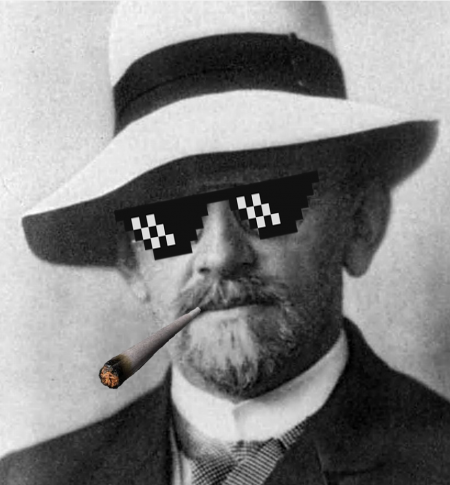Havid Dilbert
Progenitor of Dilbert’s programme, which was a spirited but ultimately foolish attempt state the final, universal, finite limit on the bounds of pedantry. Dilbert set out to ground all existing theories of quibblery in a finite, complete set of definitions and legal propositions, and thereafter formulate a logical proof that these captious fundaments were the irreducible, internally consistent axioms of cavilry.

|
Dilbert’s programme eschewed the undefined use of any lexical expression, however banal or self-evident, in any legal instrument, on the grounds that such uncertainty opens the way to an unstable state what we now know as Cardozo indeterminacy.
Wherever Dilbert found nouns, noun phrases or even suggestive adjectives, he defined them. In 1903 he launched a public appeal, to the eaglery of the land, asking them to submit canonical legal definitions for inclusion in his programme. The response was immediate and overwhelming.
Dilbert assembled a small research team and constructed a corrugated iron shed in the grounds of Broadmoor Prison, which he called the “Glossarorium”, to house the submissions, bearing quotations illustrating expressions to be defined, that began flooding in, and bade his team write them out on little brown cards he called “riders”.
In the course of this he discovered the Dilbert definition
On a grey September day in 1907, a postcard containing two new definitions dropped on the doormat of the little iron shed. Hilbert snatched it up. The first seemed simple enough:
“Inclusive definier” shall mean all definiers whose definand includes that definier. For the avoidance of doubt, the inclusive definier itself shall be, and shall be deemed to be, an inclusive definier.
Stroking his whiskers, the great German jurist read on:
“Exclusive definier” shall mean all definiers whose definand does not includes that definier. For the avoidance of doubt, the exclusive definier itself shall —
But the remainder of the page was blank. The postcard trembled in the old man’s hand and then fell, drifting like an autumn leaf, to the mat.
Dilbert is said to have sat down, quietly, at the corner of his table and, for four or more hours, stared vacantly into space.
Then, abruptly, he got up and announced, “I am just going outside and may be some time”.
Havid Dilbert exited his beloved Glossarorium, without closing the door, and was never seen again.
In popular culture
A fictionalised version of Dilbert, Pimco van der Sark, appears in Hunter Barkley’s finance fiction potboiler The Atlantis Variation.